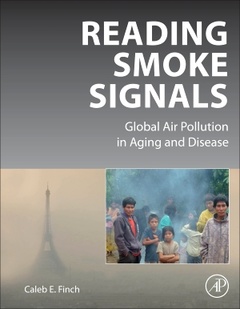Description
The Role of Global Air Pollution in Aging and Disease
Reading Smoke Signals
Author: Finch Caleb E.
Language: English
Subjects for The Role of Global Air Pollution in Aging and Disease:
Keywords
AHR and ApoE; Alzheimer disease; Ambient air pollution (AAP)Amyloid �-peptide (A�)ApoE; Ambient air pollution; Atherosclerosis; Biomass burning; Biomass smoke; Brain neurons; myelin; white matter; Carbon monoxide (CO)DNA methylation (DNAme)Epigenetics; Carotid artery; Cigarette smoke (CS)Dementia; Cigarette smoke; Dung smoke; Dust; Endotoxin; Exposome fossil fuels; Exposome; Fine PM; PM2.5Free radicals; Fossil fuel predictions; Future longevity; Gases carbon monoxide; hydrogen sulfide; nitric oxide polycyclic aromatic hydrocarbons (PAHs)Inflammation and oxidative stress; Genomic imprints; Global warming; Household air pollution; Human evolution during the changing exposome; Inflammation; Leptin; Longevity; Lung cancer; Metals copper; iron; nickel; Mortality rates; Mosquito days; Ozone; Particulate matter (PM) coarse PM; PM10PM entry to brain and across the placenta; PM0.2PM2.5Secondhand smoke (SHS)Synergies of CS and AAP; PM10PM2.5Toxicity; Polycyclic aromatic hydrocarbons (PAHs)Traffic-related air pollution (TRAP)Ultrafine PM; PM0.2US environmental policy
218 p. · 15x22.8 cm · Hardback
Description
/li>Contents
/li>Readership
/li>Biography
/li>Comment
/li>
Global Air Pollution in Aging: Reading Smoke Signals is a complete reference connecting environmental pollution research to the human aging process. Since 1800, lifespans have more than doubled as infections declined and medicine improved. But the 20th century introduced a new global scourge of air pollution from fossil fuels with the potential to damage arteries, hearts and lungs that has been related to chronic exposure of air pollution from fossil fuels. Risk areas of study include childhood obesity, brain damage associated with air pollution, increased risk for autism in children and dementia in older adults.
In humans and animals, air pollution stimulates chronic inflammation in different organs, and genetic vulnerability to air pollution is being recognized, particularly for carriers of the Alzheimer risk gene ApoE4.
1. Air Pollution history in health and lifespan2. The nature of Air Pollution3. Air Pollution and adult disease4. Air Pollution in human development5. Air Pollution in future human health and life spans
Researchers and clinicians studying biomedical aging. Also applicable to environmental biologists and public health workers.
Dr. Finch became a University Distinguished Professor in 1989, an honor held by sixteen other professors at USC who contribute to multiple fields. He is a member of five editorial boards and has written four books including The Biology of Human Longevity (Academic Press 2007) as well as over 470 articles.
- Connects environmental pollution research to the human aging process
- Raises new issues relevant to the controversies on air pollution and global warming, challenging assumptions that lifespan will continue to increase in the 21st Century
- Examines the burden of air pollution to disadvantaged populations, with anticipated greater impact in developing countries which rely on fossil fuels for economic development in future decades

